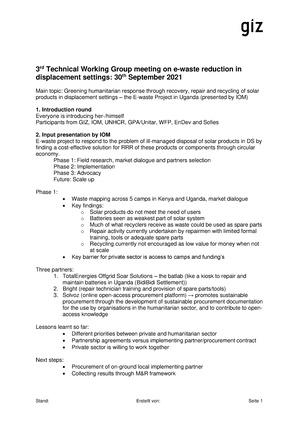Difference between revisions of "Humanitarian E-Waste Network"
***** (***** | *****) m Tag: 2017 source edit |
***** (***** | *****) m Tag: 2017 source edit |
||
| Line 5: | Line 5: | ||
Along with increased off-grid electricity access in humanitarian crises and protracted displacement situations, hazardous electronic wastes accumulate and become more and more an environmental and health hazard. | Along with increased off-grid electricity access in humanitarian crises and protracted displacement situations, hazardous electronic wastes accumulate and become more and more an environmental and health hazard. | ||
| − | Addressing this, [[Energy Solutions for Displacement Settings|SUN-ESDS]] launched a '''cross-organisational technical working group on E-waste Reduction in Displacement Settings''' in 2021. The objective is to join forces to minimise the consequential e-waste of increased energy access by creating synergies and enabling the exchange of technical information and knowledge. Due to the growing interest of the stakeholders in this topic, we renamed the working group into '''Humanitarian E-Waste Network''' (HEWN) in January | + | Addressing this, [[Energy Solutions for Displacement Settings|SUN-ESDS]] launched a '''cross-organisational technical working group on E-waste Reduction in Displacement Settings''' in 2021. The objective is to join forces to minimise the consequential e-waste of increased energy access by creating synergies and enabling the exchange of technical information and knowledge. Due to the growing interest of the stakeholders in this topic, we renamed the working group into '''Humanitarian E-Waste Network''' (HEWN) in January 2022. It is a platform for UN organisations, international organisations, NGOs and others operating in the humanitarian space to combine efforts and advocate for responsible Energy Access and E-Waste Management in and around refugee settlements. |
=Objectives= | =Objectives= | ||
Revision as of 10:34, 10 March 2022
Background
Along with increased off-grid electricity access in humanitarian crises and protracted displacement situations, hazardous electronic wastes accumulate and become more and more an environmental and health hazard.
Addressing this, SUN-ESDS launched a cross-organisational technical working group on E-waste Reduction in Displacement Settings in 2021. The objective is to join forces to minimise the consequential e-waste of increased energy access by creating synergies and enabling the exchange of technical information and knowledge. Due to the growing interest of the stakeholders in this topic, we renamed the working group into Humanitarian E-Waste Network (HEWN) in January 2022. It is a platform for UN organisations, international organisations, NGOs and others operating in the humanitarian space to combine efforts and advocate for responsible Energy Access and E-Waste Management in and around refugee settlements.
Objectives
- Network to join forces and to minimise the consequential waste of increased energy access;
- Exchange implemented experiences from the ground and get to know who is doing what in this area;
- Increase and transfer knowledge on E-Waste in the humanitarian context.
Activities
- Meet every three months to get input (e.g., through a short presentation) and have discussion on one selected topic such as repairability, collection schemes, procurement standards and project activities, among others;
- Moderated mailing list for peer-to-peer information exchange;
- Represent a platform to connect with each other and do specific activities, e.g., in Task Forces.
HEWN meeting minutes
1st meeting on 4th March 2021:Agenda:
- Mapping of actors and updates
- E-waste strategy: Which efforts are taken by actos to tackle e-waste? What can we do more?
- Potential synergies: Where can we work together and what data/information can we share?
- Topic for the next meeting
Agenda:
- Input from University of Edinburgh regarding their work on 'Pathways to repair in the global off-grid solar sector'
- Debate/discussion on repairability and e-waste friendly procurement standards for off-grid energy products
- Topic for the next meeting
Becoming part of the network
If you want to be part of this network and help creating awareness on this important topic, please register here:
Resources/Links
Gogla Toolkit: E-Waste | GOGLA
University of Edinburgh study: Pathways to Repair in the Off-Grid Solar Sector
Partners
GIZ's Energy Solutions for Displacement Settings (ESDS) project cooperate with UNHCR to enhance the access to sustainable energy in displacement contexts, and the Energypedia page has been created to share learnings across various practitioners to spur the development of clean energy solutions.





















